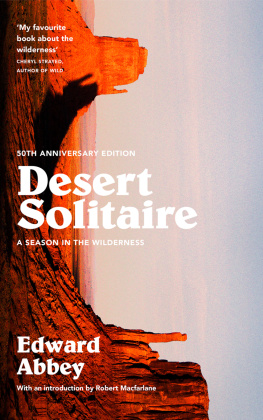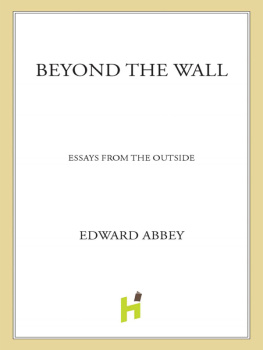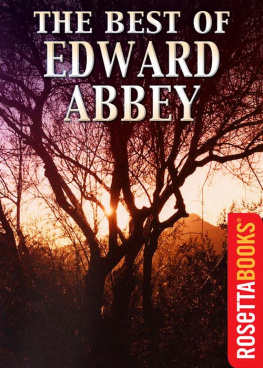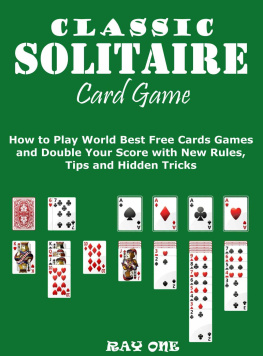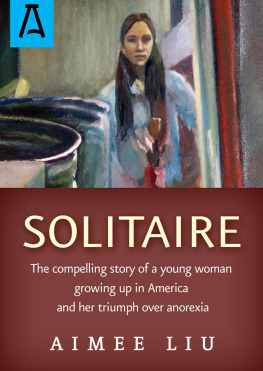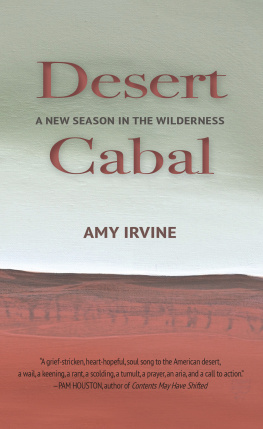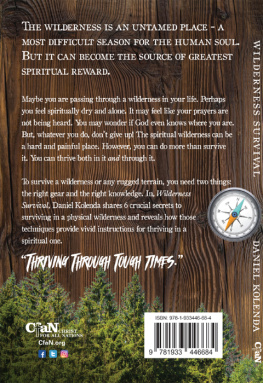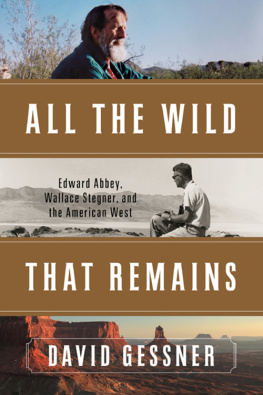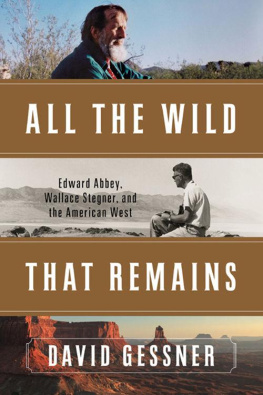Edward Abbey - Desert Solitaire: A Season in the Wilderness
Here you can read online Edward Abbey - Desert Solitaire: A Season in the Wilderness full text of the book (entire story) in english for free. Download pdf and epub, get meaning, cover and reviews about this ebook. year: 1985, publisher: Ballantine Books, genre: Science. Description of the work, (preface) as well as reviews are available. Best literature library LitArk.com created for fans of good reading and offers a wide selection of genres:
Romance novel
Science fiction
Adventure
Detective
Science
History
Home and family
Prose
Art
Politics
Computer
Non-fiction
Religion
Business
Children
Humor
Choose a favorite category and find really read worthwhile books. Enjoy immersion in the world of imagination, feel the emotions of the characters or learn something new for yourself, make an fascinating discovery.
- Book:Desert Solitaire: A Season in the Wilderness
- Author:
- Publisher:Ballantine Books
- Genre:
- Year:1985
- Rating:4 / 5
- Favourites:Add to favourites
- Your mark:
- 80
- 1
- 2
- 3
- 4
- 5
Desert Solitaire: A Season in the Wilderness: summary, description and annotation
We offer to read an annotation, description, summary or preface (depends on what the author of the book "Desert Solitaire: A Season in the Wilderness" wrote himself). If you haven't found the necessary information about the book — write in the comments, we will try to find it.
Desert Solitaire: A Season in the Wilderness — read online for free the complete book (whole text) full work
Below is the text of the book, divided by pages. System saving the place of the last page read, allows you to conveniently read the book "Desert Solitaire: A Season in the Wilderness" online for free, without having to search again every time where you left off. Put a bookmark, and you can go to the page where you finished reading at any time.
Font size:
Interval:
Bookmark:
William Collins
An imprint of HarperCollinsPublishers
1 London Bridge Street
London SE1 9GF
WilliamCollinsBooks.com
This eBook first published in Great Britain by William Collins in 2018
First published in the United States by McGraw-Hill in 1968
Copyright 1968 by Edward Abbey, renewed 1996 by Clarke Abbey
Introduction copyright Robert Macfarlane 2018
The Estate of Edward Abbey on behalf of the Author asserts the moral right to be identified as the author of this work in accordance with the Copyright, Designs and Patents Act 1988
Cover design by Ben Gardiner
Cover photograph by Jeremy Bishop on Unsplash
Frontispiece image Wikimedia Commons/Nikater (2002)
A catalogue record for this book is available from the British Library
All rights reserved under International and Pan-American Copyright Conventions. By payment of the required fees, you have been granted the non-exclusive, non-transferable right to access and read the text of this e-book on screen. No part of this text may be reproduced, transmitted, down-loaded, decompiled, reverse engineered, or stored in or introduced into any information storage and retrieval system, in any form or by any means, whether electronic or mechanical, now known or hereinafter invented, without the express written permission of HarperCollins.
Source ISBN: 9780008283315
Ebook Edition May 2018 ISBN: 9780008283322
Version: 2018-09-14
for Josh and Aaron
Midway through this magnificent, maddening, abrasive, lyrical, lackadaisical kick-ass manifesto and dream-vision of a book, Edward Abbey describes climbing a switchback trail up from the banks of the Colorado to the high rock desert through which the river has cut its vast course. The trail is steep, the day hot and Abbey becomes so thirsty that he sucks damp sand in an attempt to extract its moisture. Nevertheless, he persists in his ascent and at last emerges on the surface of a rolling plain of cross-bedded sandstone, where he is rewarded with the view for which he has been hoping. To the north-west he can see the island-mesa of the Kaiparowits Plateau and the descending levels of Grand Staircase-Escalante; away to his east are the salmon-pink buttes and hidden canyons of Bears Ears.
Abbey revels in what is concealed as well as what is revealed: he walks out to an isolated point, realises he can see no evidence of human presence bar his own sweating body, and stands there listening to the immense silence, watching the heat waves rising from the naked rock. It is one of the many scenes in the book where Abbey ritually performs his definition of desert wilderness for his readers: a place that is defined by an utterness of matter, a deep-time vastness of space and earth-history; a place that humbles the human presence, and that should be left in the (gendered) phrasing of the US Wilderness Act of 1964 as an area where the earth and its community of life are untrammelled by man, where man himself is a visitor who does not remain.
I write this essay fifty years since the first publication of Desert Solitaire, and I write it in a month when parts of the landscape that Abbey surveyed from that rimrock above the Colorado stand imperilled by the legislative actions of Donald Trump. In December 2017, Trump announced his intention to dramatically shrink the extent of two National Monuments in the state of Utah: Grand Staircase-Escalante, which he reduced by almost half of its former extent, and Bears Ears, cut by 84 per cent. This reduction of two million acres of public land which came into force on 2 February 2018 is the biggest rollback of federal land protection in the history of the United States, and a centrepiece of the Trump administrations broader assault on both conservation as idea and practice, and public land preservation specifically. One of the explicit intentions of the rollback is to open up both areas to the extractive industries (for coal and uranium in particular); as such it symbolically furthers Trumps alignment with white working-class especially mining and ranching communities.
Announcing the shrinkage of Bears Ears in San Juan County in December, Trump both stoked and spoke to what Jedediah Purdy has called a public-lands populism; that is, a populism which favors local, motorized and extractive uses of [western] public lands over federal policy-making, non-motorized recreation, and reservation for aesthetic or cultural purposes. In the view of this populism, all federal public lands National Monuments, National Parks, Wilderness Areas in the western states represent an illegal form of domestic colonialism, an unjust land-grab begun by Ulysses S. Grant and Theodore Roosevelt over a century previously. Public-lands populists argue for the drastic reduction of federal control on grounds of historical illegitimacy, and the anomalously large extent of federal land in western states as compared to eastern and Midwestern states. This anti-regulatory, anti-federal narrative is itself tangled up in older western narratives about masculinity, liberty, self-reliance and the defence of sovereignty, all of which reach back into the earliest white incursions into these regions. Most problematically, proponents of contemporary public-lands populism, as Purdy has shown, have often sought to de-legitimate the Native American presence in the West, casting pro-preservation movements as a conspiracy of green (environmentalist) and brown (Native American) groups.
Since Trump declared the rollback in December, I have been considering what Abbeys response would be to the proposals. Its tempting just to quote Hayduke, the hell-raiser hero of Abbeys cult novel The Monkey Wrench Gang (1975): My job is to save the fucking wilderness, declares Hayduke unambiguously, I dont know anything else worth saving. Hayduke would, certainly, have poured sand in the fuel-tanks of mining machines and waged eco-guerrilla war on the infrastructure of incursion. But Hayduke is not Abbey and Desert Solitaire, Abbeys fullest exploration of the ideas of wilderness, is a book from which it can be surprisingly hard to extract hard-and-fast positions, built as it is in Abbeys own phrase on both paradox and bedrock.
Abbey pledges his allegiance above all to land, sandstone and the more-than-human world. Long live diversity, long live the earth is the rallying cry he raises early in the book. He is unwaveringly against the development of wild land either for resource exploitation or for what he contemptuously calls Industrial Tourism. These positions form his bedrock. His paradoxes, though, are numerous. He despises motor vehicles, except when he is driving one. He celebrates personal liberty but also wishes to lose his sense of self in the desert. He is an eco-centric misanthropist but also a localist whose sympathy lies most with blue-collar workers, including miners. He is suspicious of the federal state and a keen supporter of the Second Amendment. He contradicts himself repeatedly and with relish: Im a humanist: Id rather kill a man than a snake. Doctrinally, he might be said to lie somewhere between Bakunin, Ammon Bundy and David Attenborough. But as Emerson observed, consistency is the hobgoblin of tiny minds. Abbeys mind was expanded by the desert lands in which he took his stand, and his compellingly uncategorizable book is fully hobgoblin-free.
Like many great works of place-writing, Desert Solitaire has no plot. It describes as the subtitle has it a season in the wilderness of Arches National Park. Like many great works of place-writing, Desert Solitaire also plays fast and loose with time, for into that single season Abbey in fact collapses the stories and reflections of several years spent in the wider desert landscapes of the American south-west. What is presented as an almanac, running from April to September, is in fact more of an anthology of episodes from what he modestly describes as Gods navel, Abbeys country, the red wasteland.
Font size:
Interval:
Bookmark:
Similar books «Desert Solitaire: A Season in the Wilderness»
Look at similar books to Desert Solitaire: A Season in the Wilderness. We have selected literature similar in name and meaning in the hope of providing readers with more options to find new, interesting, not yet read works.
Discussion, reviews of the book Desert Solitaire: A Season in the Wilderness and just readers' own opinions. Leave your comments, write what you think about the work, its meaning or the main characters. Specify what exactly you liked and what you didn't like, and why you think so.

